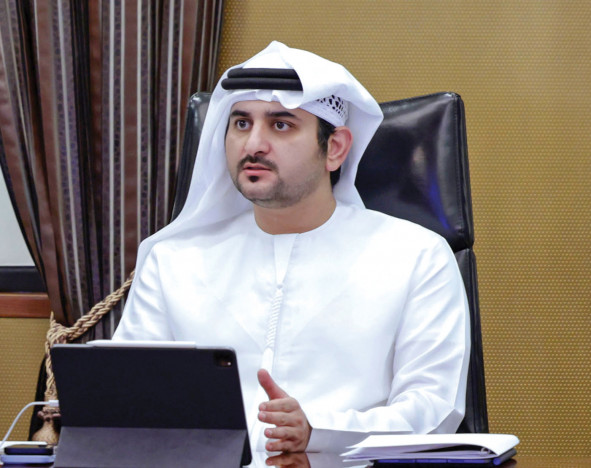
Maktoum bin Mohammed reviews first annual performance report of Dubai Probate Court
His Highness Sheikh Maktoum bin Mohammed bin Rashid Al Maktoum, First Deputy Ruler of Dubai, Deputy Prime Minister and Minister of Finance of the UAE and Chairman of the Judicial Council in Dubai, reviewed the Dubai Probate Court's first annual performance report. This review reflects His Highness Sheikh Maktoum's continued oversight of the court, established pursuant to Decree No. (25) of 2023.
The report outlined the Probate Court’s main achievements, including the recording of 1,814 estate files of which 68% were completed, and the issuance of 1,287 estate inventory certificates. The value of appraised estate amounted to over AED342 million, while the total value of estate claims and judicial committee cases submitted to the Court amounted to over AED32.8 billion, with 71% of rulings issued by the First Instance Division of the Court being approved.
H.H. Sheikh Maktoum bin Mohammed said the establishment of the Probate Court and its performance reflect the strategic approach outlined by His Highness Sheikh Mohammed bin Rashid Al Maktoum, Vice President and Prime Minister of the UAE and Ruler of Dubai, to enhance public trust in Dubai's judicial system. This is achieved by providing exceptional judicial services, upholding the rule of law, and ensuring justice for all.
His Highness noted that the Probate Court's significant achievements in its first year demonstrate Dubai's commitment to developing a world-class judicial system. This specialised court efficiently addresses inheritance disputes, contributing to social and family cohesion and economic stability, in line with both Dubai Social Agenda 33 and Dubai Economic Agenda D33.
“Supporting our judicial system with the latest technologies remains a top priority to ensure a fair, independent judiciary characterised by transparency and integrity. This reinforces Dubai's position as the world's best city to live in, renowned for its just and efficient judicial services.”
Dr. Saif Ghanem Al Suwaidi, Director General of Dubai Courts, said: “The Probate Court represents a significant advancement in Dubai's judicial system, providing swift and effective legal solutions for all parties involved in inheritance disputes.”
He further emphasised that the court embodies Dubai's commitment to transparent and efficient justice, reflecting H.H. Sheikh Mohammed bin Rashid 's vision to establish Dubai as a global model for upholding individual rights and delivering prompt justice.
Judge Mohammed Jassim Al Shamsi, Head of the Probate Court, said the Court has implemented comprehensive improvements, including launching the smart applications system, which speeds up the processing of applications and improves service efficiency. A training programme, offered in collaboration with the Dubai Legal Institute, aims to improve the skills of judicial and administration teams, so that they can efficiently process probate cases.
Other improvements include a special training programme, which trained 38 experts over 12 training hours on the duties and rights of inheritance guardians as well as estate liquidation procedures. A special diploma for estate guardians was also offered in collaboration with Dubai Legal Institute, with 25 members joining its first cohort.
“A dedicated office has been established to support the Probate Court and estate administration, providing technical and consultation assistance to optimise workflow,” HE Al Shamsi added. “Other improvements, like the introduction of a two-tier litigation system, including the right to appeal final decisions, have enabled the Probate Court to enhance the quality of its judicial services and expedite case resolution, contributing to the overall effectiveness of the judicial system."
Professor Abdullah Saif Al-Sabousi, Secretary General of the Dubai Judicial Council, stated that the Probate Court has demonstrated its effectiveness in managing the increasing volume of estate claims. By implementing simplified and standardised procedures, the court provides comprehensive legal solutions and expedites dispute resolution. Its improving performance indicators underscore its vital role in supporting Dubai's specialised judicial system.
In its first eleven months, the Dubai Probate Court demonstrated significant efficiency, processing 1,814 inheritance cases. Of these, 68% (1,234 cases) were fully completed, and an additional 23% (424 cases) were partially resolved. The court also achieved a 77% completion rate for guardianship cases involving non-Dubai national minors. Furthermore, the Court issued 972 estate inventory certificates for Muslims and 315 for non-Muslims.
Leveraging technology and reflecting a commitment to improving services through digital channels, the Court processed 34,124 smart applications with an average turnaround time of just five hours and 13 minutes. Focusing on amicable resolutions, the court received 760 settlement requests and successfully resolved disputes related to 626 properties. A total of 344 full and partial agreements were reached, resulting in amicable settlements valued at approximately AED2 billion. The average amicable settlement time was an efficient 40 days, achieving a 42% settlement rate. The total value of estate claims handled by the court exceeded AED32.8 billion, while the value of appraised estate assets surpassed AED342 million.
The Probate Court was established as a specialised judicial body to adjudicate all inheritance-related matters. By consolidating all such cases under a single jurisdiction, the court streamlines the judicial process, reduces litigation time, and promotes efficient and comprehensive justice through standardised and simplified procedures.
